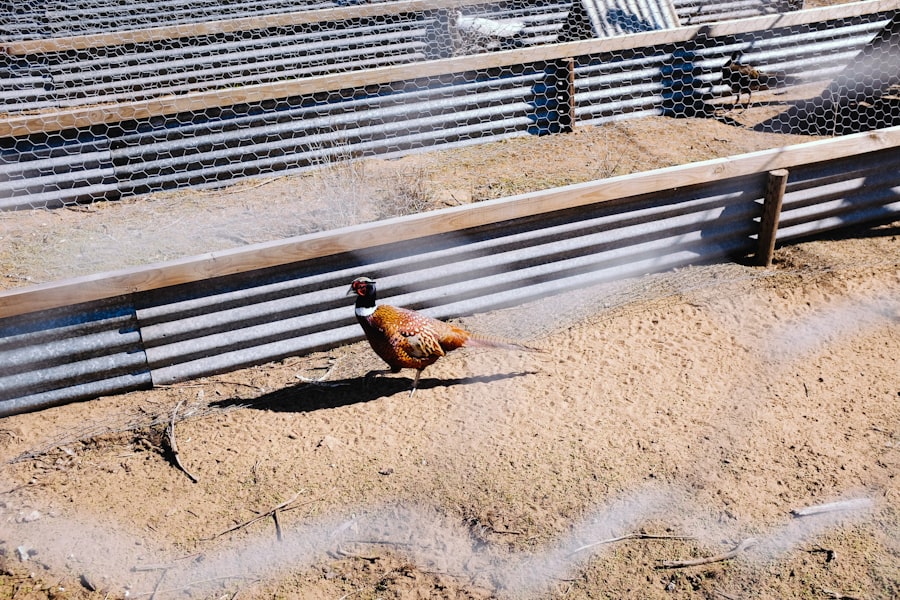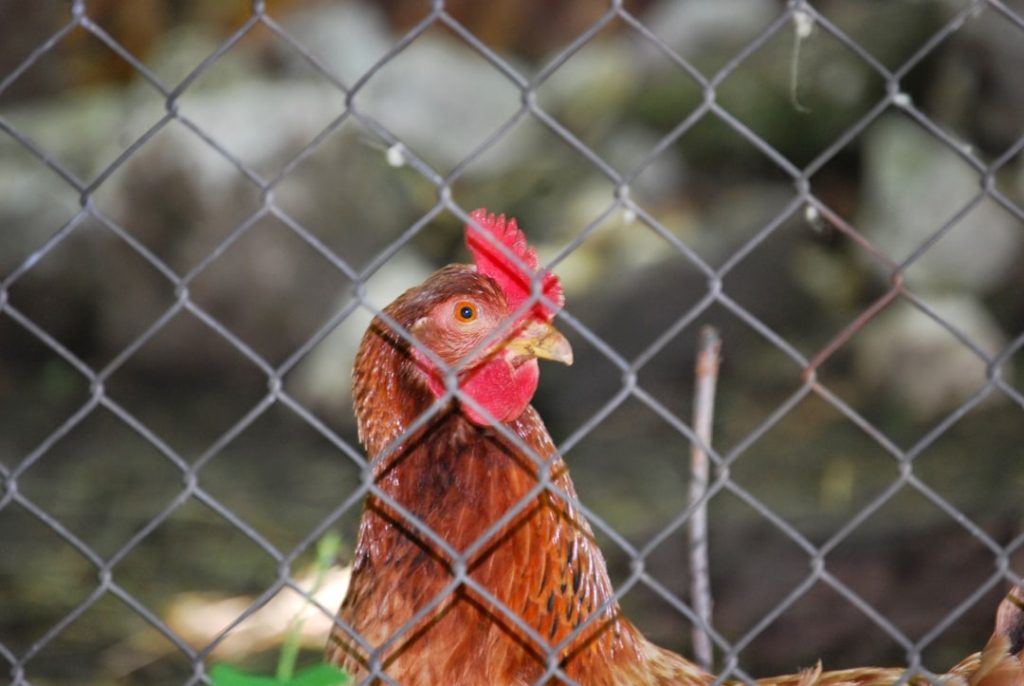Chickens are social and inquisitive birds known for their pecking behavior. They are attracted to shiny objects and may peck at various items that catch their attention. These birds possess a strong instinct to scratch and forage for food, which can result in damage to gardens and flower beds.
Chickens are easily startled by sudden movements or loud noises, potentially causing them to flap their wings and collide with fences or other structures. Understanding these behavioral traits is essential for developing effective strategies to prevent chickens from damaging property. Chickens are creatures of habit and can quickly adapt to specific routines or environments.
Once they discover access to a garden or yard, they are likely to return to the same location repeatedly. This characteristic is important to consider when implementing deterrents, as finding the most effective solution may require experimentation. By comprehending chicken behavior, it becomes easier to anticipate their actions and develop strategies to effectively prevent them from causing damage.
Table of Contents
- 1 Creating Physical Barriers
- 2 Installing Chicken-Proof Fencing
- 3 Using Visual Deterrents
- 4 Implementing Sound Deterrents
- 5 Providing Distractions and Entertainment
- 6 Seeking Professional Help
- 7 FAQs
- 7.1 What are some effective methods for keeping chickens off my fence?
- 7.2 Why is it important to keep chickens off my fence?
- 7.3 Are there any natural deterrents that can be used to keep chickens off my fence?
- 7.4 What are the potential risks of allowing chickens to perch or roost on my fence?
- 7.5 How can I train my chickens to stay off my fence?
Key Takeaways
- Chickens are naturally curious and will explore their surroundings, including areas they are not supposed to be in.
- Physical barriers such as fences and netting can help keep chickens out of unwanted areas.
- Chicken-proof fencing should be at least 6 feet tall and buried at least 6 inches into the ground to prevent chickens from digging under it.
- Visual deterrents such as scarecrows and reflective objects can help deter chickens from entering certain areas.
- Sound deterrents such as motion-activated alarms or clanging noise makers can startle chickens and discourage them from entering restricted areas.
- Providing distractions and entertainment such as hanging treats or toys can keep chickens occupied and less likely to wander into unwanted areas.
- If chicken-proofing measures are not effective, seeking professional help from a poultry expert or animal control may be necessary.
Creating Physical Barriers
Physical Barriers
One of the most effective ways to deter chickens from entering a specific area is by creating physical barriers. This can be done by installing fences or using netting to block off access to gardens, flower beds, or other areas where chickens may cause damage. When creating physical barriers, it is important to ensure that they are tall enough to prevent chickens from flying over them, as well as sturdy enough to withstand the pecking and scratching behavior of the birds.
Protecting Plants and Landscaping
Another option for creating physical barriers is to use chicken wire or hardware cloth to cover the ground in areas where chickens may dig and scratch. This can help protect plants and landscaping from being damaged by the birds’ natural foraging behavior.
Raised Garden Beds and Containers
Additionally, using raised garden beds or containers for plants can provide an extra layer of protection against chickens.
Installing Chicken-Proof Fencing

Installing chicken-proof fencing is a highly effective way to keep chickens out of specific areas. Chicken wire or hardware cloth can be used to create a barrier around gardens, flower beds, or other areas where chickens may cause damage. It is important to bury the bottom of the fencing at least 6 inches into the ground to prevent chickens from digging underneath it.
Additionally, the fencing should be tall enough to prevent chickens from flying over it. When installing chicken-proof fencing, it is important to ensure that there are no gaps or openings that chickens could squeeze through. It may also be helpful to reinforce the bottom of the fencing with rocks or bricks to prevent chickens from pushing their way underneath it.
By installing chicken-proof fencing, property owners can effectively protect their gardens and landscaping from damage caused by chickens.
Using Visual Deterrents
Visual deterrents can be an effective way to deter chickens from entering specific areas. One option is to use scarecrows or other decoys that resemble predators, such as owls or hawks, to create the illusion of danger for the chickens. These visual deterrents can be placed strategically around gardens or other areas where chickens may cause damage, and should be moved regularly to prevent the birds from becoming accustomed to them.
Another visual deterrent that can be effective in deterring chickens is reflective tape or shiny objects, such as CDs or aluminum foil, that can be hung around gardens or other areas where chickens may cause damage. The reflective surfaces can startle the birds and discourage them from entering the area. By using visual deterrents, property owners can effectively deter chickens from causing damage without causing harm to the birds.
Implementing Sound Deterrents
Sound deterrents can also be effective in deterring chickens from entering specific areas. One option is to use motion-activated devices that emit loud noises when chickens approach. These devices can startle the birds and discourage them from entering the area.
It is important to place these sound deterrents strategically around gardens or other areas where chickens may cause damage, and to adjust the sensitivity settings as needed to ensure they are triggered by the birds’ presence. Another sound deterrent that can be effective in deterring chickens is playing recorded sounds of predators, such as dogs or birds of prey, in areas where chickens may cause damage. The sounds of potential predators can create a sense of danger for the birds and discourage them from entering the area.
By implementing sound deterrents, property owners can effectively deter chickens from causing damage without causing harm to the birds.
Providing Distractions and Entertainment

Providing Visual Stimulation
One way to deter chickens from causing damage is by providing distractions and entertainment that will keep them occupied and less likely to engage in destructive behaviors. This can be done by providing toys or objects for the chickens to peck at and play with, such as hanging mirrors or shiny objects in their coop or run.
Offering Perches and Platforms
Additionally, providing perches or platforms for the birds to roost on can help keep them entertained and less likely to engage in destructive behaviors.
Food-Based Distractions
Another option for providing distractions and entertainment for chickens is by offering them treats or food puzzles that will keep them occupied and engaged. This can include scattering scratch grains or mealworms in their coop or run, or using treat dispensing toys that require the birds to work for their food.
By providing distractions and entertainment for the chickens, property owners can help prevent them from causing damage to gardens and landscaping.
Seeking Professional Help
In some cases, deterring chickens from causing damage may require seeking professional help. This can include consulting with a poultry expert or animal behaviorist who can provide guidance on effective deterrent strategies. Additionally, professional pest control services may be able to offer solutions for deterring chickens from specific areas without causing harm to the birds.
Another option for seeking professional help is contacting local animal control agencies or wildlife rehabilitation centers for assistance with deterring chickens from causing damage. These organizations may be able to provide advice on humane deterrent methods and offer resources for addressing issues with nuisance wildlife on private property. In conclusion, understanding the behavior of chickens is crucial in finding effective ways to deter them from causing damage to property.
Creating physical barriers, such as fences and netting, can help protect gardens and landscaping from being damaged by the birds’ natural behaviors. Visual deterrents, such as scarecrows and reflective surfaces, as well as sound deterrents, such as motion-activated devices and recorded predator sounds, can effectively deter chickens from entering specific areas without causing harm to the birds. Providing distractions and entertainment for the birds can also help prevent them from engaging in destructive behaviors.
In some cases, seeking professional help may be necessary for finding effective solutions for deterring chickens from causing damage. By implementing these strategies, property owners can effectively protect their gardens and landscaping from being damaged by chickens while ensuring the well-being of the birds.
If you’re looking for more information on keeping chickens, you might be interested in learning about the best kind of coop for chickens. Check out this article for tips on choosing the right coop for your feathered friends.
FAQs
What are some effective methods for keeping chickens off my fence?
Some effective methods for keeping chickens off your fence include installing a physical barrier such as a chicken wire or electric fence, using deterrents such as motion-activated sprinklers or reflective tape, and providing alternative areas for the chickens to roam and explore.
Why is it important to keep chickens off my fence?
Keeping chickens off your fence is important to prevent damage to the fence, reduce the risk of injury to the chickens, and maintain a tidy and secure outdoor space.
Are there any natural deterrents that can be used to keep chickens off my fence?
Yes, natural deterrents such as planting thorny bushes or using citrus peels can help deter chickens from perching or roosting on your fence.
What are the potential risks of allowing chickens to perch or roost on my fence?
Allowing chickens to perch or roost on your fence can lead to damage to the fence, potential injury to the chickens, and the spread of droppings onto the surrounding area.
How can I train my chickens to stay off my fence?
You can train your chickens to stay off your fence by providing alternative perching and roosting areas, using positive reinforcement techniques, and consistently redirecting them away from the fence.
Meet Walter, the feathered-friend fanatic of Florida! Nestled in the sunshine state, Walter struts through life with his feathered companions, clucking his way to happiness. With a coop that’s fancier than a five-star hotel, he’s the Don Juan of the chicken world. When he’s not teaching his hens to do the cha-cha, you’ll find him in a heated debate with his prized rooster, Sir Clucks-a-Lot. Walter’s poultry passion is no yolk; he’s the sunny-side-up guy you never knew you needed in your flock of friends!







